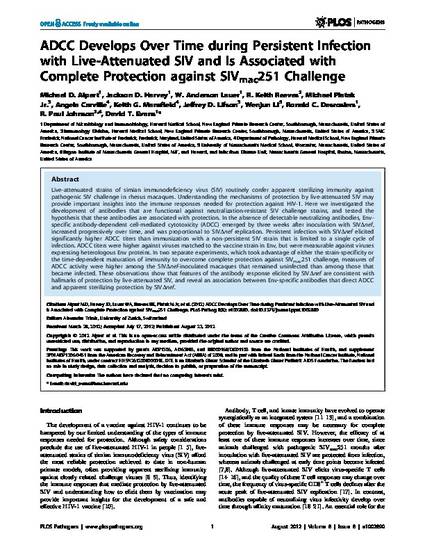
Live-attenuated strains of simian immunodeficiency virus (SIV) routinely confer apparent sterilizing immunity against pathogenic SIV challenge in rhesus macaques. Understanding the mechanisms of protection by live-attenuated SIV may provide important insights into the immune responses needed for protection against HIV-1. Here we investigated the development of antibodies that are functional against neutralization-resistant SIV challenge strains, and tested the hypothesis that these antibodies are associated with protection. In the absence of detectable neutralizing antibodies, Env-specific antibody-dependent cell-mediated cytotoxicity (ADCC) emerged by three weeks after inoculation with SIVDeltanef, increased progressively over time, and was proportional to SIVDeltanef replication. Persistent infection with SIVDeltanef elicited significantly higher ADCC titers than immunization with a non-persistent SIV strain that is limited to a single cycle of infection. ADCC titers were higher against viruses matched to the vaccine strain in Env, but were measurable against viruses expressing heterologous Env proteins. In two separate experiments, which took advantage of either the strain-specificity or the time-dependent maturation of immunity to overcome complete protection against SIV(mac)251 challenge, measures of ADCC activity were higher among the SIVDeltanef-inoculated macaques that remained uninfected than among those that became infected. These observations show that features of the antibody response elicited by SIVDeltanef are consistent with hallmarks of protection by live-attenuated SIV, and reveal an association between Env-specific antibodies that direct ADCC and apparent sterilizing protection by SIVDeltanef.
Available at: http://works.bepress.com/paul-johnson/34/
